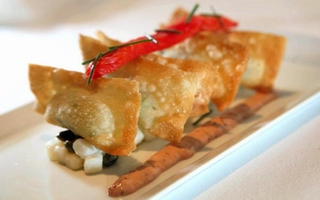
It was a vibrant, delicious area that seemed to deliver a new surprise every time I took a walk around the neighborhood.
In the mid-'70s in New York, apartment market prices started to soar. I was looking to move up from a studio to a larger apartment, and a friend told me about an available two-bedroom that actually cost less than what I was already paying. The only down side was a long subway ride from a different borough: Queens.
Jackson Heights had a completely different ethnic profile from my previous neighborhood. Here, I stumbled into a treasure trove of Indian, Colombian, Irish, Korean and Italian homespun restaurants. But it seemed that no matter what neighborhood a person happened to call home in New York City, one fixture was always a good deli.
Jackson Heights' local deli was Murray's, and it became my daily coffee/snack/lunch place before squeezing into the F train for my commute to Manhattan for work.
Run by the eponymous Murray, he was an unbelievably jovial owner, considering the abusive tack of some of the clientele. "Lean, Murray. I said lean!" followed by, "That's too lean - I don't want dry meat!" and continuing, "Why so thick? (Replace with "thin" or "medium.")
It seemed no matter how Murray would trim and cut his gorgeous, meltingly tender hunks of corned beef and pastrami, everyone was a critic. I would watch with wonder as the "Abuse Murray Show" would go on week after week - and these were all regulars!
One morning I took my usual spot at the counter and strangely, Murray was not there. The waitress told me he had had a slight heart attack and would be out for a while. Two weeks later Murray was back, slightly thinner, but slicing away with the same jovial smile. The only difference was that all those hunks of cured beef were now recognized for their perfection, as nary a negative word was heard and compliments were flying. It was a welcome reprise for Murray.
One of my favorites, besides the tasty cured meats, was the crispy kreplach that filled the grill in the front window. These were packets of thin, crepe-like dough stuffed with ground beef and onions. Usually they're boiled and used as a garnish for chicken soup, but these were griddled in schmaltz until golden brown on each side.
My recipe today is a dish I made for a menu at Sanford in 1998, celebrating the 50th anniversary of Israel. It is a mini-size kreplach inspired by Murray; I fill the won ton wrappers with a smoked salmon and potato filling, crisply fry them, then serve them with a horseradish, tomato and grainy mustard dip.
If you're not happy after trying these, please let me know - don't bother Murray.
Smoked Salmon Kreplach
Makes 36 kreplach
1 large russet potato (12 ounces)
2 tablespoons extra-virgin olive oil
4 tablespoons (½ stick) butter (or, if kosher, margarine)
5 to 6 green onions (2 ½ ounces total), cleaned and thinly sliced
2 large cloves garlic (½ ounce), peeled and finely chopped
¼ teaspoon black pepper
½ teaspoon kosher salt
½ teaspoon cayenne pepper
10 ounces good-quality skinless smoked salmon (need 8 ounces for filling and 2 ounces for garnish)
Horseradish, tomato and grainy mustard dressing (see recipe)
Wine potatoes and capers (see recipe)
36 won ton wrappers
Peanut oil to fry
Preheat oven to 400 degrees.
Bake potato in preheated oven 1 hour, until potato is tender. Let cool slightly. While potato is still warm, scoop cooked flesh out of shell and run through a ricer.





